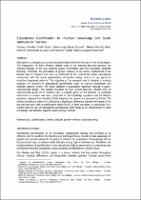Educational Gamification to Improve Knowledge and Sexist Attitudes in Teachers
Date
2024Metadata
Show full item recordAbstract
Education is undergoing a constant transformation driven by the use of new technologies. The integration of these effective digital tools in the teaching-learning process has allowed changes in the way students access information and how educators facilitate learning. Therefore, the prevention of gender violence in the school environment is not limited only to students, but must be addressed at the level of the entire educational community, with the active participation of teachers being crucial as key agents to transform ingrained patterns. The objective of the research was to develop a training program for teachers in educational gamification tools to improve knowledge and attitudes against sexism. The study adopted a quantitative approach through a quasi-experimental design. The sample included 40 high school teachers, divided into an experimental group of 20 teachers and a control group of 20 teachers. A validated instrument on sexism was used, composed of 14 knowledge questions and 26 attitude questions, adapted from Bonilla (2018), based on the dimensions proposed by Fisher. The results showed a p-value of 0, indicating a significant difference between the means of the pre and post test, with a significance value of 0.00 in both variables. In conclusion, it is evident that the use of educational gamification tools leads to an improvement in both knowledge and attitudes against sexism among teachers.
URI
https://migrationletters.com/index.php/ml/article/view/6061/4104https://hdl.handle.net/20.500.12692/133865
Collections
- Piura [151]


